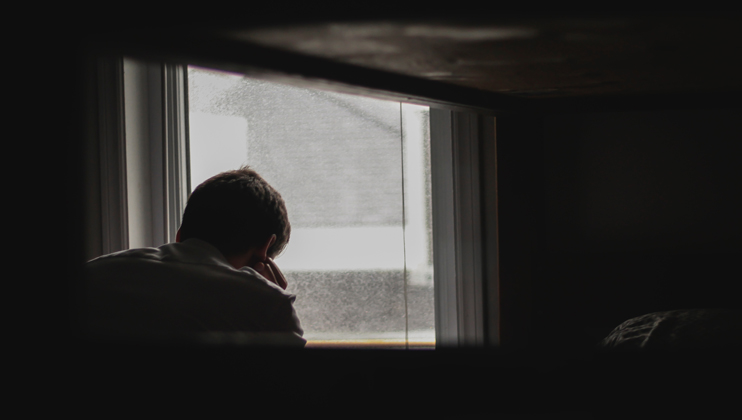All of us will experience bereavement at some point in our lives; and whether it’s the loss of a close family member, someone we worked with or someone who meant a lot to us or shaped our lives in some way, we will all be affected by the emotions and upheaval that loss brings.
People cope with grief in many different ways – for example, cultural and family traditions may dictate how we grieve, but other factors such as how we are managing at the time and the nature of the loss will also have an impact on the grieving process.
In some cultures around the world, including Britain, there can be a stigma around death, and grieving is often seen as a very private and personal process. Often we want to hide our grief, and there is sometimes an expectation we put on ourselves, and from others, that we need to limit our grieving to fit a certain timescale.
Grieving is not simply about having time to mourn; it is also about adjusting our lives around the loss. Being bereaved can leave us feeling battered and bruised and asking how an earth we can adjust to the ‘new normal’ we now have to get used to. Taking one day at a time is a good starting point, as well creating some support and structure for ourselves.
Relationships
When we are grieving it can be easy to isolate ourselves from others; as time goes on we might tell ourselves we should feel better by now or assume that other people won’t understand. Just holding a conversation can feel exhausting, but it’s important to spend time with others and take time to invest in relationships. Talk to family and friends about how you are feeling – let them share in your grief so that they know how to support you. If we are really struggling, it might be worth joining a bereavement support group; connecting with others who really know how we feel will help in coping with the loss and finding new ways of managing.
Health and wellbeing
If we are grieving and don’t take care of our physical health, it is only going to compound the problem and make us feel worse. It is very common to experience a range of physical reactions to loss including decreased appetite, exhaustion, sleep problems and aches and pains. Although motivation might be lacking in the early days, try and take care of your physical health as much as you are able by eating a healthy diet, getting enough sleep and taking time for some gentle exercise.
Self-Compassion
Being kind to yourself and accepting how you are feeling is part of the process of learning to live with loss and change. It can be easy to tell ourselves that we should keep our chin up and carry on and not acknowledge our feelings for what they are. It is important to take some time out for ourselves and not feel ashamed of the fact that we have been affected by loss – no one can be strong all the time! Also try and be aware of what your limitations are as you may not feel as resilient in the early days. Learn to say no and don’t feel bad for giving yourself time and space to relax.
Finding ways to remember
One of the things people struggle with is how to remember the person they have lost and how to keep their memory alive. Try and think of things that are personal to you; some people like to have memories of their loved one around the house, having a special decoration for the Christmas tree, or visiting special places. Find a way of keeping them present in your life in whatever way suits you and your family best.
Give yourself time
We shouldn’t expect ourselves to adjust to the changes that loss brings in an instant. Some days will remind us constantly of the loss we have experienced and other days will feel easier, which is completely fine. It is normal and natural for it to take time to figure out what life will look like after loss, and it will be different for each person. It is important for us to try not to listen to other people’s assumptions or judgements or compare ourselves to others. Just do things in your own time, and find your own way.
Structure and focus
Loss can leave us feeling as though our whole world has been left in tatters. As days and weeks go on it is important to find a new structure and routine that is manageable. Life may look very different, and although this can be a challenge it can also be an opportunity to do new things such as take up a new hobby or meet new people. The future can seem daunting at first, so just begin by putting a few small activities into your diary day by day and gradually building up from there as you feel stronger.
There is no blue print for what the grieving process should look like – everyone is different and each situation is unique, but putting these points into action could help in how we manage during the early days and enable us to work through grief at an individual pace.
Support available
As you go through the stages of grief, consider the resources that are available to you to take good care of yourself and get the right support, deciding what you need to support you during this difficult period.
There is no right or wrong way to feel. Your grief is unique, and what you need from others may be unique also. Below are some resources that you may find helpful.
We also have a range of postvention resources available for anyone who’s lost someone to suicide. Click here to browse those.
- The National Bereavement Service
- Bereavement Advice Centre: offers comprehensive advice on both practical and emotional aspects of bereavement
- The Good Grief Project: offers retreats, books, films, community
- Cruse Bereavement Care: offers face-to-face, telephone, email and online support for anyone who has experienced a loss
- BEAD (Bereaved through Alcohol and Drugs): provides information and support for anyone bereaved through drug or alcohol use
- Child Bereavement UK: provides support for anyone who has lost a child, and for children themselves who are bereaved
- Stillbirth and Neonatal Death Charity (SANDS): provides information and support for anybody affected by the death of a baby
- The Compassionate Friends: offers a range of services supporting bereaved parents and their families
- Widowed and Young (WAY): offers support to people under 50 who have lost a partner.
- Sue Ryder: offers bereavement support, as well as care for people with terminal illness and neurological conditions, including ways of finding bereavement support online
- Hub of Hope: UK-wide mental health service database. Search for local, national, peer, community, charity, private and NHS mental health support, filtering results to find specific kinds
- Samaritans: Open 24/7 for anyone who needs to talk.
If you feel you’d benefit from our support, call our Support Line on 0800 389 8820.
We also have a 24/7 Crisis Line – 0300 373 0896 – for anyone at crisis point who’s having thoughts of suicide.
Try our online courses
We have short and longer courses which are available to you online and offer more information and guidance to help you.
You can find all of these by clicking below:
Please let us know if you found this article helpful, or if there’s anything you’d like us to have focused on more in the feedback section below.
Updated: November 2023
Published: September 2022




